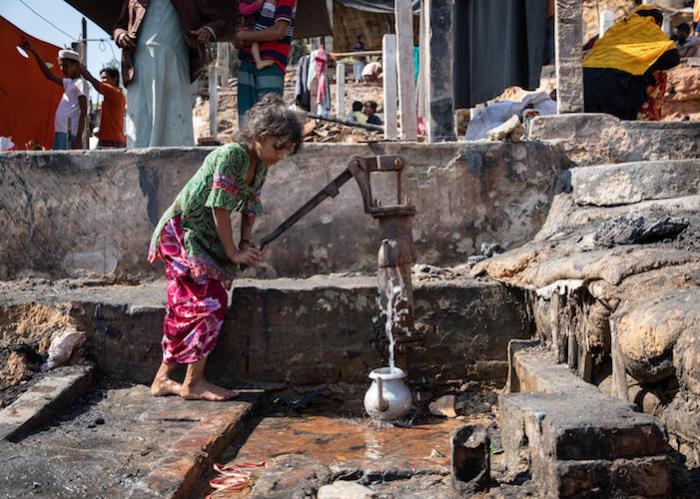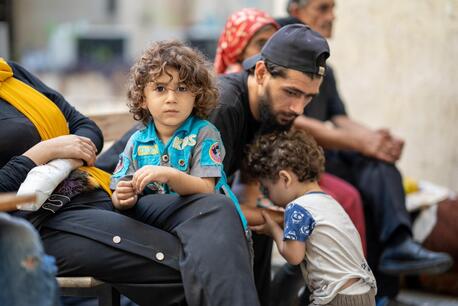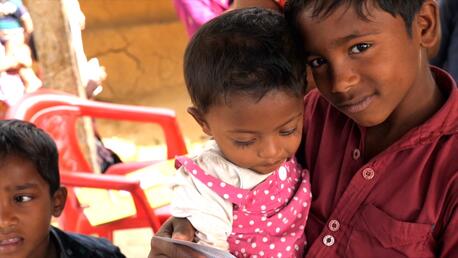
After a Devastating Fire, a Somber Ramadan for Rohingya Children
When yet another fire tore through the Rohingya refugee settlement in Cox's Bazar, Bangladesh on January 9, 2022, razing homes, learning centers and WASH facilities, UNICEF and partners rushed to aid vulnerable children and their families. Five years ago, hundreds of thousands of ethnic Muslim Rohingya fled a military-led massacre in Myanmar. For many, this is the second time they have lost everything.
The embers were still smoldering in Cox's Bazar, Bangladesh as UNICEF staff rushed to help children and families after a devastating fire swept through a Rohingya refugee camp on January 9, 2022. More than 1,700 refugees were directly affected by the fire.
As part of the multi-agency response team, UNICEF joined partner organizations in the efforts to provide food, water, clothing and shelter to displaced refugees. The fire ravaged two blocks of Camp 16, burning down 300 shelters and damaging another 500, and severely damaging UNICEF's water supply network.
More than 1,700 Rohingya refugees were directly affected when fire swept through their camp

A view of the damages after a fire destroyed homes, learning centers and WASH facilities in Camp 16, part of the vast Rohingya refugee settlement in Cox's Bazar, Bangladesh. © UNICEF/UN0575259/Lateef
Two UNICEF-supported learning centers benefitting almost 200 children were also destroyed in the blaze. The next day, UNICEF Communication Specialist Rashad Wajahat Lateef spoke with Jamal, a young boy who attended one of the learning centers. "This place caught fire," said Jamal. "Our house and all our belongings got burnt. Our learning center went up in flames. All our books and toys burned down. The mosque and my neighbors' houses all burned down ... My family needs a home right now. I need my learning center and books."
A brutal ethnic cleansing campaign drove ethnic Muslim Rohingya refugees out of Myanmar and into southern Bangladesh in 2017

On November 25, 2017, children look out at shelters in the Balukhali makeshift settlement — one of the camps ravaged by fire in March 2021 — in Cox's Bazar, Bangladesh. © UNICEF/UN0148170/Brown
"Home" is a complicated word for Rohingya families. In August 2017, 725,000 ethnic Muslim Rohingya refugees fled a military-led campaign of violence in Myanmar, sometimes with little more than the clothes on their backs, and crossed the border into southern Bangladesh. There, they built one of the world's largest refugee settlements, a sea of closely packed — and highly flammable — bamboo and tarp shelters.
In Bangladesh, Rohingya refugees were free to observe Ramadan without sanctions for the first time

A family breaks sunset fast during Ramadan in Modurchara Camp 5, part of the sprawling Rohingya refugee settlement in Cox's Bazar, Bangladesh on June 4, 2018. © UNICEF/UN0219105/Modola
Observing Ramadan without fear of reprisal is a relatively new concept for the Rohingya community. Before they were forced out of Myanmar's Rakhine State, where they had lived for centuries, they prayed in secret or risked arrest. Mosques sprang up in the crowded encampments of Cox's Bazar and refugee families felt free to fast, pray and study the Quran.
"It feels good to do that," Jafor Alam told a reporter during his first Ramadan in Bangladesh in 2018. "Here we can pray."
"Here we can pray," said one Rohingya refugee

In Cox's Bazar, Bangladesh in 2017, 10-year-old Rohingya refugee Mohammed clutched two copies of the Holy Quran, the only belongings he had left after he fled mass ethnic violence in Myanmar. © UNICEF/UN0147324/Brown
"In Myanmar, we were harassed a lot. Mosques were shut down. We weren't allowed to recite the Quran or pray," said Rashed, a Rohingya boy living in Kutupalong Refugee Camp. "To be a good Muslim, you have to learn the Quran and all our Islamic rules like giving alms to the poor so that everyone's equal, all the things Islam tells us to do so that we go to heaven."
UNICEF is on the ground in Bangladesh, reaching Rohingya refugees with critical services

A girl uses an old hand-pump tube-well for water after the UNICEF-supported water tap network in Camp 16 was severely damaged by the January 9, 2022 fire. © UNICEF/UN0575260/Lateef
During the holy month of Ramadan, Rohingya families displaced yet again are struggling to rebuild their lives. Meanwhile, COVID-19 remains a constant threat in the crowded camps, where social distancing and access to soap and water for handwashing remain hard to come by.

Rohingya refugee Ayatollah and his two sons Yasin, 8, and Amin, 5, stand by the remains of their belongings after losing their home to the fire in Camp 16. © UNICEF/UN0575256/Lateef
Ayatollah and his sons, Yasin, 8, and Amin, 5, lost almost everything in the recent fire. “My cousin lost his home a few months ago. Now I have lost my home," he said. "We are all afraid of when the next fire will come."
Rohingya children need our support now

Five-year-old Jamila was terrified when fire broke near her family's shelter. © UNICEF/ UN0580000/Lateef
Just days after the fire, UNICEF staff set up a temporary learning center so children could resume their learning and have a safe place to play. Talking with a UNICEF psychosocial first aid worker at the center helped 5-year-old Jamila process the trauma she experienced the night of the fire.
The sound of exploding gas canisters, used for cooking in the settlement, sounded like bombs to her. “There were bombs everywhere," she said. "I was very scared. I was crying. My grandmother brought me out of the camp and then I stopped crying. But my feet got hurt when we were running so I started crying again."
In 2021, UNICEF provided critical lifesaving support to nearly 202,000 people living in Cox's Bazar — 115,860 Rohingya refugees and 85,535 people in host communities. Right now, UNICEF is rebuilding learning centers, repairing water, sanitation and hygiene facilities, providing nutrition, health, immunization and child protection services and more.
This Ramadan, we are reminded of our responsibility and power to do good. Please donate today to help UNICEF keep vulnerable children safe and healthy.
Top photo: Rohingya refugee Tahrim consoles her infant daughter after their shelter was destroyed in a fire on January 9, 2022 in Camp 16, part of the sprawling refugee settlement in Cox's Bazar, Bangladesh. © UNICEF/UN0431933/Mohsi
HOW TO HELP
There are many ways to make a difference
War, famine, poverty, natural disasters — threats to the world's children keep coming. But UNICEF won't stop working to keep children healthy and safe.
UNICEF works in over 190 countries and territories — more places than any other children's organization. UNICEF has the world's largest humanitarian warehouse and, when disaster strikes, can get supplies almost anywhere within 72 hours. Constantly innovating, always advocating for a better world for children, UNICEF works to ensure that every child can grow up healthy, educated, protected and respected.
Would you like to help give all children the opportunity to reach their full potential? There are many ways to get involved.




